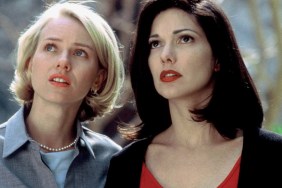
I had not yet seen a Roberto Rossellini film, which made Il Generale Della Rovere my debut feature from the helmer. No worries, I just queued Rome, Open City, which according to the video essay in the Della Rovere is his only other “big success.” That statement, of course, is in reference to Rossellini’s box-office prowess, and does not reflect his filmmaking ability or the effect his films had on cinema and his peers.
Starring Italian cinema icon Vittorio De Sica (director of The Bicycle Thief) the film is set in Italy during World War II. Germans occupy the city of Genoa and Emanuele Bardone (De Sica) has made a nasty habit of taking advantage of his fellow Italians by exploiting their family losses and conning them into thinking he will help them find (and potentially save) their missing loved ones. As an addicted gambler he continues down a path consisting of losing money just as quickly as he is taking it until one day he is picked up by the Nazis and forced to impersonate a dead partisan general in an effort to gain information. Bardone is to become General Della Rovere.
This is the second film from Criterion I have reviewed recently centered on WWII and thankfully neither focused on the United States involvement, which serves as a huge breath of fresh air. The other Criterion title I mention is, of course, Francois Truffaut’s The Last Metro (reviewed here) and what infatuates me most about these films is seeing the effect WWII had on other countries without the American angle beating you over the head. And these are personal films to these directors as films such as Della Rovere and The Last Metro help open my eyes to viewpoints and experiences I would otherwise be blind to considering my unfortunate lack of historical knowledge.
While Truffaut’s The Last Metro was a fictional story based on factual occurrences, Della Rovere is based on a true story as told by Indro Montanelli and Rossellini’s neo-realistic approach to the material adds so much to the story as does De Sica’s performance, even though so much of the film was obviously shot on a stage. The stage work did serve as a mild distraction, but the included interviews touch upon the fact the film was made 14 years after the end of WWII, which makes it obvious as to why set locations were used. Additionally, the included essay written by James Monaco considers this the start of Rossellini’s “artificial realism” phase in which he melded artificial settings with realistic action. Della Rovere does just that on many instances, including a set built prison, which is fantastic, to go along with the inclusion of archival footage.
In terms of supplements, Rossellini’s daughter, actress Isabella Rossellini, talks for a little over 13 minutes and, among other things, tries to draw a comparison between Della Rovere to Akira Kurosawa’s Kagemusha, which doesn’t quite work, but she seems to think it does so I won’t stand in her way. Other family members that add to the conversation are Rossellini’s son Renzo Rossellini who also served as assistant and second-unit director on Della Rovere; Rossellini’s daughter Ingrid Rossellini who is a professor of Italian literature at NYU and Adriano Apra, who is a Rossellini scholar who expands on the personal connections of the story for both De Sica and Rossellini, something Isabella also touches on in her interview.
The only other feature is a 15 minute visual essay discussing the origins of the film and its eventual release. The essay is led by film scholar Tag Gallagher, author of “The Adventures of Roberto Rossellini”. The essay is a good way to get an idea of how and where the film fits into history, and why it was released 15 years after the events in the film take place. Gallagher’s speaking is rather monotone, which takes away from the essay a little, but at 15 minutes I did actually watch it twice before writing this review. There is also a theatrical trailer and an included booklet featuring an essay by film critic James Monaco and an excerpt from a 2000 interview with Indro Montanelli, who is, as I said, the author of the story that inspired the film.
On the whole I wouldn’t say this is a movie you have to watch, but it does hold a place in Italian cinema and the included visual essay helps give some added perspective on Rossellini’s career. As this was my first time seeing one of Rossellini’s films I enjoyed the included supplements and the film itself, but wouldn’t say it is necessarily a must buy unless you are looking to complete your Rossellini collection or have an addiction to Criterion to the point you want every spine number. My suggestion would be to give it a rental and if it moves you enough to purchase it then move forward at that point, but as a blind buy for those that haven’t seen it I cannot suggest that.








